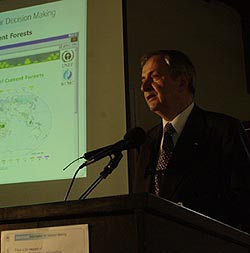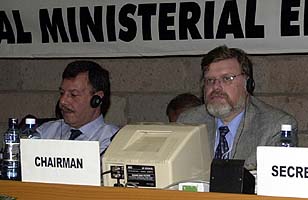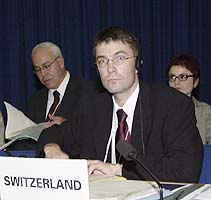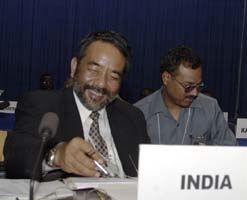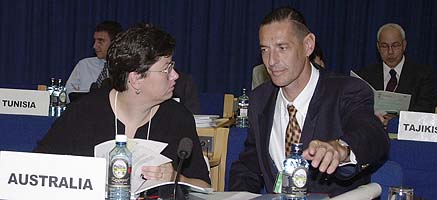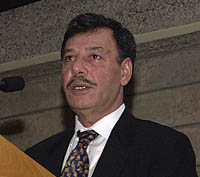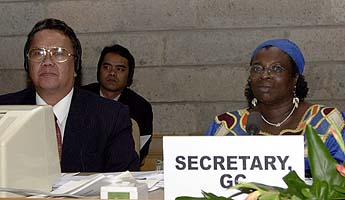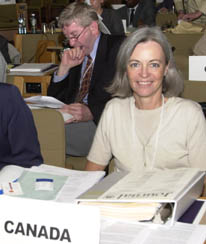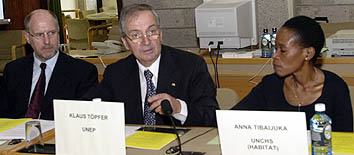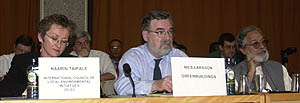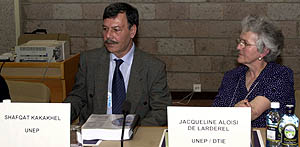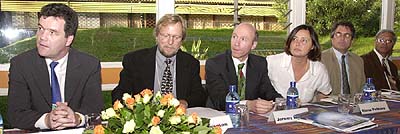 
|
|
|
21st Session of the UNEP Governing Council Nairobi,
KENYA |
|
|
| monday 05 | tuesday 06 | wednesday 07 | thursday 08 | friday 09 |summary | |
|
Tuesday 06 February 2001
Delegates met in morning and afternoon sessions of the Plenary and the Committee of the Whole. The Plenary addressed agenda items on emerging policy issues, the outcome of the sixth special session of the Governing Council, and contributions to future sessions of the Commission on Sustainable Development (CSD). The Committee of the Whole (COW) began its consideration of UNEP's subprogrammes and related draft decisions, forwarding several decisions to the Drafting Group, which began its work to finalize text late afternoon. A Working Group on programme and budget matters also convened. |
|
|||||||||||||||||||||||||||||||||||
|
|
||||||||||||||||||||||||||||||||||||
COMMITTEE OF THE WHOLE
|
||||||||||||||||||||||||||||||||||||
|
Environmental assessment and early warning: Deputy Executive Director Kakakhel introduced this subprogramme, outlining outputs such as the Millennium Ecosystem Assessment, the Global International Water Agreement (GIWA), and GEO publication. The EU encouraged environmental assessment and early warning as a core UNEP activity and supported the allocation of budget funds to this programme. NORWAY and SWITZERLAND highlighted UNEP's important role in linking the scientific community with policy-makers. Timothy Foresman, Director, Division of Early Warning and Assessment (DEWA), noted that future GEO regional outputs would emphasize Internet-based dissemination. |
||||||||||||||||||||||||||||||||||||
|
Environmental policy development and law:
In discussions on this subprogramme, the US, supported by EGYPT and AUSTRALIA, expressed concern over the proposed activities with regard to strengthening the legal basis of the precautionary approach as contained in the Rio Principles and a global survey on the status of the application of environmental norms by military establishments. TURKEY, INDIA and EGYPT suggested deletion of an activity item on provision of advisory services for the establishment of a water basin agreement, stressing that it is beyond UNEP's mandate. |
||||||||||||||||||||||||||||||||||||
|
AUSTRALIA underscored the link between environmental degradation and human health. She pointed out that it is premature to consider developing legal arrangements concerning transboundary air pollution in Asia and the Pacific, and together with ANTIGUA and BARBUDA, noted that the UNEP's programmme of work should not duplicate IPCC's on climate change. In response, the Secretariat noted that in preparing the work programme it intends to balance governments' request and its mandates. |
||||||||||||||||||||||||||||||||||||
Environmental policy implementation: Deputy Executive Director Kakakhel noted that this subprogramme represents UNEP's implementation arm that translates policy into action, and outlined key objectives. In the ensuing discussion, several delegates praised this subprogramme, addressing the objective of promoting compliance with and enforcement of environmental law, strengthening measures for preventing and mitigating environmental damage, supporting implementation of relevant chapters of the Montevideo Programme III, the development of training materials and guidelines on compliance, enforcement and environmental crime, and environmental threats and emergencies. |
||||||||||||||||||||||||||||||||||||
|
PLENARY: UNEP Executive Director Klaus Töpfer introduced agenda items on emerging policy issues, the outcome of the sixth special session of the Governing Council, contributions to future sessions of the CSD. Discussions addressed the state of the environment, linkages between poverty and environmental problems, funding support to developing countries, the Convention to Combat Desertification, UNEP's role in disaster reduction, environmental issues and human security, transfer of sound technologies, chemicals, hazardous wastes, civil society participation, the Aarhus Convention, and the lead-up to the World Summit on Sustainable Development. |
||||||||||||||||||||||||||||||||||||
|
Word of the Day : "governance" Delegates have been discussing the global environmental governance issue, with talk focused on a discussion paper prepared by Canada. Some participants seemed lukewarm on the paper, expressing reservations on the need for a new process or establishing new institutions when there is a need to evaluate the implementation of the Töpfer Taskforce's recommendations. However, there seems to be a strong consensus that UNEP should at least address this issue and integrate and link any proposals within the intergovernmental process of the Governing Council and contribute to preparatory work for the World Summit for Sustainable Development. This would ensure that, whatever the outcome of the Summit in South Africa, UNEP is involved in the process. On the other hand, some participants have cautioned that, given the lack of time to consider the paper, it might not be practical to expect this Governing Council meeting to reach a concrete decision on the matter. A number of participants have also expressed reservations on the idea of establishing an outside "eminent persons advisory panel." There is also the perception that the scope of international environmental governance is wider than just environmental, but should cover sustainable development governance. |
||||||||||||||||||||||||||||||||||||
|
|
||||||||||||||||||||||||||||||||||||
|
|
SIDE EVENTS: Energy & Cities : Sustainable Building and Construction
Klaus Töpfer, UNEP Executive Director, stated that there is a direct relationship between development of cities and environmental concerns, but conceded that changing existing structures can only be a medium- to long-term exercise, therefore shifting focus on better urban planning of future growth and new cities. He highlighted that these issues are particularly important to stakeholders of climate change and human settlements, and reinforce challenging pressures for renewable energy to provide viable solutions. Anna Tibaijuka, Executive Director, Habitat, noted that environmental management depends on settlement partterns and that reproportionalization of settlement is needed. She highlighted that planning should take a multi-disciplinary approach, should be participatory and inclusive, should involve ministerial cooperation, should provide training and coordination among government actors, should utilize sustainable construction methods, and indigenous technologies. Panelists addressed architecture & eco-design, sustainable city planning, sustainable city planning, and sustainable construction. Challenges include inefficient energy use, urbanization and sprawl, waste disposal, water pollution and loss, local and global air pollution, and transport problems. Solutions include efficient energy design, renewable energy technologies, sustainable water management, eco-design and architecture, environmentally sound tecnologies and planning.
|
|||||||||||||||||||||||||||||||||||
|
Information for Decision Making UNEP's Division of Early Warning and Assessmet (DEWA) sponsored this side event featuring panel presentations on the value and practice of facilitating access to environmental information for decision-making.
Klaus Töpfer, UNEP Executive Director, stated in his opening remarks that providing information was a pre-condition for public participation, and stands on the agenda for the 9th meeting of the Commission on Sustainable Development (CSD9) and the 2002 World Summit on Sustainable Development (Rio+10). Noel Dempsey's keynote address covered Irish experiences in environmental information generation and disemination. Dempsey highlighted local requirements to provide environmental information to anyone who requests it, and the posting of environmental planning for public scrutiny and input. Jeremy Wates, Secretary, Aarhus Convention, notes that strenthening society and engaging stakeholders in a dialogue requires providing people with rights to information. |
||||||||||||||||||||||||||||||||||||
|
|
||||||||||||||||||||||||||||||||||||
|
Relevant Information:
Past IISD Coverage:
|
||||||||||||||||||||||||||||||||||||
|
|
||||||||||||||||||||||||||||||||||||
